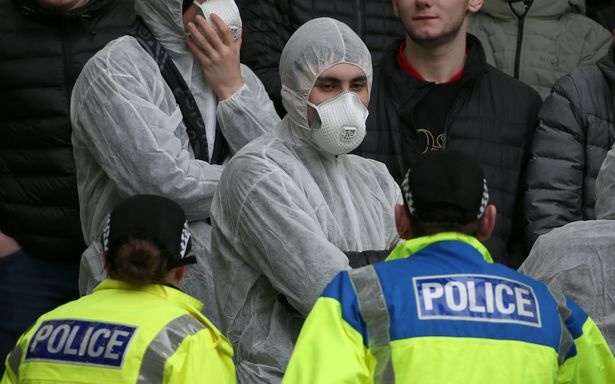“It is critical in these extraordinary times for the actions of governments and their security services to be questioned, challenged, and reviewed.”
Originally published by the Social Sciences Birmingham Forum:
Last week, a former UK Supreme Court Justice – Lord Sumption – warned that police responses to the Coronavirus outbreak were turning parts of Britain into a “police state”.
Sumption pointed in particular to the “frankly disgraceful” behavior of the Derbyshire Constabulary, whose officers had reportedly sought to deter civilians from non-essential travel by dyeing lagoons black, establishing checkpoints, and surveilling walkers with drones. Reports have also emerged of police telling local retailers to cease selling non-essential food items, including Easter eggs, and “shaming” on social media those apparently not observing the Government Covid-19 advice. Sumption, who questioned whether the Government’s “cure may be worse than the disease”, condemned officers for “shaming our police traditions”.
See also Coronavirus: Extra UK Police Powers Risk Public Trust
Of course, Britain is not a police state. I say this as a researcher who travels (or, at least, once traveled) to semi- and fully authoritarian states on a regular basis and has published on governance, security, and insecurity in authoritarian regions, states, and spaces. In many of the world’s authoritarian states, police officers constitute a fearful and unpredictable force to be avoided or deferred to wherever possible. This is not where Britain is today.
Indeed, the fairly rapid response from police chiefs to Sumption’s statement, and to wider media criticism of “over-zealous” policing, underscores the robustness of UK norms of accountability around state overreach and “policing by consent”, even in this most challenging of contexts.
This has included a range of statements from the country’s most senior officers instructing police to pursue “persuasion and education” with those disregarding government advice. New guidelines are ensuring a consistent approach across the country’s forces.
However, the controversy makes it uncomfortably apparent that rapidly-developing emergencies can destabilize the public’s relationships with, and perceptions of, states and security forces. This can have potentially far-reaching consequences. Trust is easy to lose but often very difficult to regain.
“Illiberal Practices” Are Not Just for Authoritarians
Much commentary on authoritarianism and the Covid-19 outbreak has focused on whether authoritarian rule can be blamed for the shape and spread of the pandemic, or whether authoritarian states are better adapted to dealing with crises such as this than their democratic counterparts. The outcome of this deliberation remains as inconclusive as that on the relationship between political systems and economic development.
Analysts have also placed emphasis on the various ways in which the globe’s strongmen and populists have capitalzed on the opportunity presented by the pandemic to entrench or at least extend their hold on power. This has included green-lighting rule by decree in Hungary, court shutdowns in Israel, and pre-emptive emergency declarations in Malawi by the country’s oresident, whose controversial re-election was recently annulled.
But with much of the democratic world operating under a state of emergency, it is important for us to reconsider the terms of the debate on authoritarianism. Authoritarian tactics can be found not only within states traditionally labelled as undemocratic. In Paraguay, police have humiliated and threatened with tasers those in poor neighborhoods leaving their homes in search of food or a living wage. In India, the world’s largest democracy, migrant workers returning to their home states have been sprayed with bleaching agent by police and curfews have been maintained through beatings, humiliation, and tear gas.
As Marlies Glasius has argued, authoritarianism is best seen as a set of illiberal practices which can exist or arise anywhere. It is not just a phenomenon confined within the borders of a particular category of state.
See also How Coronavirus Could Topple Governments
“Everyday Authoritarianism”
Moreover, authoritarianism is not just about what happens in parliaments and presidential palaces. For most, perceptions of the state’s authority are mediated through everyday interactions with its local representatives, including the police. Authoritarian practices are as much about the relationship of individuals and communities with state officials as they are about the prevailing political dispensation.
The arbitrary policing practices pointed to by Lord Sumption and others have come as less of a surprise to Britain’s communities of color. As one activist recently noted: “for some young people of colour, daily life was already locked down well before Coronavirus.”
Police tend to deploy more authoritarian practices in their engagement with minority communities across a range of notional democracies, from the US to Israel. There is a degree of “everyday authoritarianism” to life in almost every part of the world, and it can be determined as much by who you are than by where you are.
Indeed, it is often in the gap between official diktat and local interpretation where authoritarianism flourishes. Discretion and tyranny are two sides of the same coin.
This is why it is so critical in these extraordinary times for the actions of governments and their security services to be questioned, challenged, and reviewed – even while accepting the broader necessities of social distancing and other measures to slow the spread and impact of the virus.
Covid-19 is not changing political systems across the globe. However, it is accentuating authoritarian practices and trajectories that already exist. These deserve scrutiny and censure.

